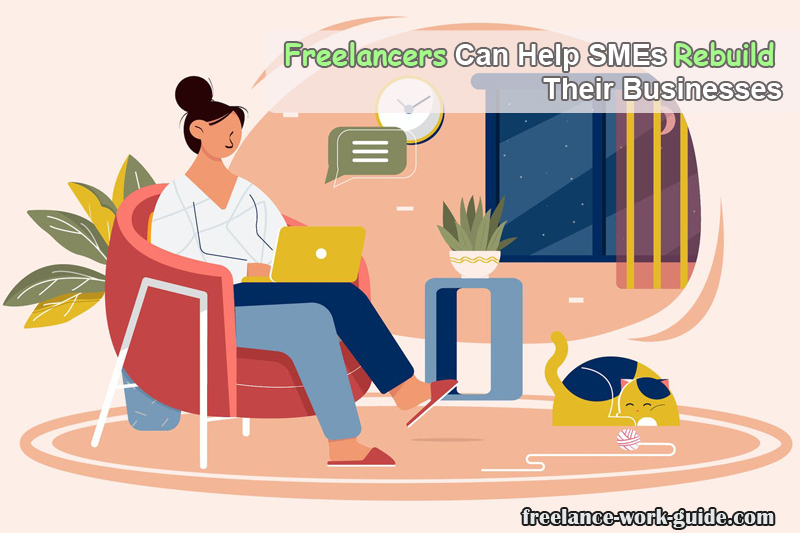
Things have been tough for businesses for well over a year now. Almost every sector of the economy has been impacted by the coronavirus pandemic. Businesses, particularly small and medium sized, have been left counting the cost. Despite the development of vaccines, many are still worrying about what the recovery will look like.
Many businesses have been forced to reduce staff numbers to survive the various lockdowns and now operate with a skeleton staff of a few key members. But as the economy opens again these businesses will have to adjust quickly and effectively to remain competitive and function properly.
This is where freelancers will come in. Many companies, SME’S particularly, will need to investigate the gig economy to adapt quickly, retrain new staff and rebuild to help them flourish as things begin to return to normal. Hiring freelancers instead of permanent staff is a more economical solution for the time being until companies get back on their feet and business starts coming back in.
Filling the Skill Gaps
The pandemic forced companies to put projects on hold and furlough or shed the staff involved. As businesses begin to resume these projects, freelancers will play a vital role in filling the skill gaps left by staff made redundant during lockdowns.
When it comes to rehiring after the pandemic timing is key – do it too quickly and you have increased overheads before the demand is there but take too long and you risk not being able to fulfil orders and losing your competitive advantage.
Re-hiring and retraining will take time and effort, new employees will often need a certain amount of time to assimilate into the business. But companies will need to fill their skill gaps quickly to remain competitive. A freelancer can step right into the role, be that sales, marketing, graphic design, admin etc. Freelancers are used to getting on quickly with the job in hand.
During difficult times, freelancers can fulfil essential roles for a certain period until things calm down and the situation improves. In addition, the use of freelancers can help to maintain a competitive edge. Freelancers are only as good as their last role and are motivated to do their utmost.
In an ideal world, recruiting the best people eventually leads to a strong, financially viable business. However, in the post-Covid 19 era, the focus should be on revenue generating employment. Filling the roles essential to fulfil orders and regenerate the business should be the priority.
Fresh Perspective

Freelancers can bring a new perspective to struggling businesses, introducing a more flexible ethos to firms who are looking for the best way to accommodate new business models and a more flexible working approach after the lockdown period.
Bringing new talent into a business can foster growth, boost employee morale, and generate fresh thinking. New ideas and talent can take businesses in directions they otherwise would not have considered.
Flexibility

By encompassing freelance talent with payroll staff, a company can gain the flexibility it needs to adjust to everything from new products to pandemics. A freelance-infused workforce allows businesses to:
- Find talent for specific projects without committing to a long-term position.
- Bolster an existing team with the skills boost it needs to meet a challenging goal.
- Build up—or slim down—in response to changing economic conditions.
Growth

Surviving such tumultuous times requires resourcefulness. Business may ebb and flow so responding to demand when it exists will be a challenge if many staff have been cut. Freelancers enable businesses to respond to demand on a job-by-job basis, doing only what business comes their way. Without the investment required for hiring permanent staff, overheads will be minimised and profits maximised.
This way a company can grow as the economy opens again without the need for big investment.
Bournemouth based exhibition contractor Quadrant2Design is one such company operating in this way. Freelancers have enabled them to respond to sporadic demand during these difficult times. CEO Alan Jenkins said ‘Employing freelancers has allowed us to skip the recruitment process and meet the orders as they come in. We have been able to return to business as normal much faster than we would have otherwise.’
Being active and completing orders is not just beneficial for the profit it brings, but also for the company image. By fulfilling what demand there is, a business is demonstrating to other potential clients that they are open for business, responding to customers and running a tight ship.
Low Risk Experimentation

In the current economic climate, businesses cannot afford to stagnate. Freelancers give the potential to branch out into new areas with minimal risk. Say a company sees a gap in the market for a new product development but does not have the internal resources to fulfil this demand. Employing freelancers will bring in the necessary skills to branch out into a new area without the commitment of full-time staff.
Now, following the fallout caused by numerous lockdowns, companies will be forced to rely on freelancers to fill their skill gaps and enable them to rebuild their businesses and grow.
During these difficult times, the importance of having creative business talent in situ and ready to go will be essential to drive companies forward. Businesses should be exploring every aspect of growth and innovation to survive the fallout of the Coronavirus pandemic. By embracing freelancers into the workplace businesses can move forward with purpose and overcome the challenges presented by the pandemic.
About Author:
Caroline Grey is a content writer for Quadrant2Design, with extensive experience in the exhibition and events industry. She uses this industry knowledge to write articles and guides to help businesses, across different industries, with all their exhibition needs.















